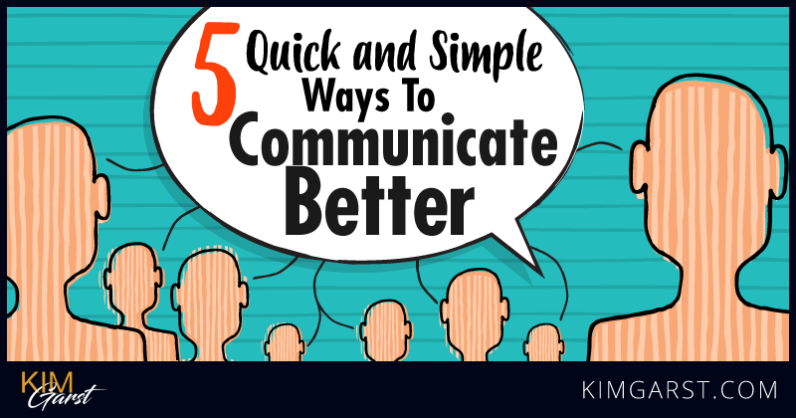Do you ever feel like you’re the worst communicator in the room? Do you stumble over your words, struggle to get out your thoughts, or frequently feel awkward when engaged in social or business interactions? If so, you’re not alone. Becoming a better communicator isn’t rocket science, but does require that you pay attention to some basic tenets of respectful communication.
5 quick and simple ways to communicate better:
1. Never Talk Over Others
Particularly if you’re an extrovert, it can be tempting to share your thoughts before your conversation partner is actually done talking. It can feel like your idea or thought is so critical to the conversation that it just can’t wait. Unfortunately, talking over others can come across as disrespectful or even downright rude. We learn it in kindergarten, but it’s always good to be reminded: don’t interrupt and always wait your turn.
2. Don't Finish Other’s Sentences
When you’re engaged in a particularly exciting or enthralling conversation, it’s easy to jump in and complete other people’s sentences. If you’re frequently guilty of this, it may not be entirely your fault: research shows that our brains are wired to nearly constantly predict what others are going to say. But while it may come naturally, jumping in and finishing someone else’s sentences is more akin to interrupting than actually helping them express themselves. Resist the urge to fill in the blanks and wait to hear what others are actually going to say.
3. Get to the Point
Have you ever been talking to someone for 10, 20 or even 30 minutes, and realized that you’ve hardly been able to get a word in? People who ramble aimlessly, offering irrelevant details and stories will never win awards for their communication skills. Particularly in professional settings, stay on point and be concise. Share the most important facts or details first; then if there’s time left over, you can spend some time chitchatting without having your conversation partner feel locked in.
4. LISTEN
Sounds so obvious, right? You probably know the old saying, “God gave us two ears and one mouth for a reason”. Yet many of us still lack basic listening skills. Becoming a good listener involves learning a number of key behaviors:
- Using open body language (i.e. no crossed arms)
- Actually listening rather than thinking about what you’re going to say next
- Keeping an open mind, and focusing on and visualizing what the other person is saying
- Asking clarifying questions where appropriate
5. Maintain Eye Contact
Have you ever been talking to someone whose eyes are constantly roaming around the room? It’s not a good feeling, and can convey a sense of disinterest or boredom. Much of our communication is nonverbal, and one of the most important methods of nonverbal communicate is eye contact. Be sure to focus on your conversation partner, maintaining an appropriate level of eye contact. Put aside distractions like your phone or computer, and give them the same level of attention you would expect from them.
Final Thoughts
Anyone can become a better communicator by implementing the 5 strategies above. Being an active listener, monitoring your body language and resisting the urge to interrupt are all basic communication skills, but ones that are easy to forget. Instead of worrying about how you come across in social or professional settings, shift your focus onto those around you. When in doubt, ask yourself, “How do others feel when they’re with me?”. If people feel respected, valued and heard, your communication skills are probably just fine.
What would you add to this list? Share in the comments below!
*I’m compensated by University of Phoenix for this blog and, as always, all thoughts and opinions are my own.
About Author
Kim Garst
Kim Garst is one of the world's most retweeted people among digital marketers. She is a renowed business strategist, keynote speaker and an international best-selling author of Will The Real You Please Stand Up, Show Up, Be Authentic and Prosper in Social Media. Kim helps business owners grow their business using social and digital media.
She is the founder of KG Enterprises, LLC, a business strategy consulting company that helps business owners create more sales using the power of digital and social media.
Kim is also internationally recognized as a thought leader in the social media space. Forbes named her as one of the Top 10 Social Media Power Influencers. Her blog is one of the top social media resources in the world.
You can find more great content from her at www.kimgarst.com/blog.



1 thought on “5 Quick and Simple Ways To Communicate Better”
Great tips! Im an extrovert myself and always the storyteller, and I checked the first 3 boxes. The good thing (i guess) is that i already know i do this and i even joke about it with my friends. The thing for me is that i want the same kind of details when someone is telling something and im a very good listener. I will remember your story BECAUSE of the details. I love engaging with other’s stories to the point that im living them firsthand (finishing their sentences because im feeling them, interrupting because i want to know exactly who said what and what did you do next, how you felt about it and when was it). But this tips gave me a lot to think about and to control myself, specially the getting into the point part! Great job!